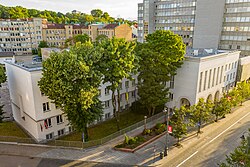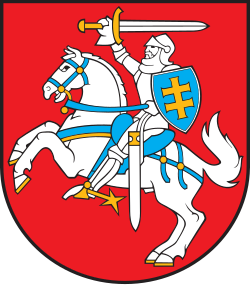| Constitutional Court of the Republic of Lithuania | |
|---|---|
| Lietuvos Respublikos Konstitucinis Teismas | |
 | |
 | |
| 54°41′17″N25°16′23″E / 54.688°N 25.273°E | |
| Established | 1992 |
| Jurisdiction | Republic of Lithuania |
| Location | Gediminas Avenue, Vilnius, Lithuania |
| Coordinates | 54°41′17″N25°16′23″E / 54.688°N 25.273°E |
| Composition method | Renewed by a third every three years, each judge nominated by the President, Speaker of Seimas and the Head of the Supreme Court and appointed by Seimas [1] |
| Authorised by | Constitution of Lithuania |
| Judge term length | 9 years (only one term allowed) [1] |
| Number of positions | 9 |
| Website | lrkt.lt |
| President of the Constitutional Court of Lithuania | |
| Currently | Gintaras Goda |
| Since | 6 April 2023 |
Constitutional Court of the Republic of Lithuania (in Lithuanian : Lietuvos Respublikos Konstitucinis Teismas) is the constitutional court of the Republic of Lithuania, established by the Constitution of the Republic of Lithuania of 1992. It began the activities after the adoption of the Law of Constitutional Court of the Republic of Lithuania on 3 February 1993. Since its inception, the court has been located in Vilnius.
Contents
The main task of the court is judicial review. It may therefore declare the acts of the Seimas unconstitutional and thus render them ineffective. As such, it is comparable to the Federal Constitutional Court of Germany or, in a limited scope, to the Supreme Court of the United States. However, it differs from it and other supreme courts in that it is not part of the regular judicial system, but more a unique judicial branch. Most importantly, it does not serve as a regular court of appeals from lower courts or as a sort of "superappellate court" on any violation of national laws.
Its jurisdiction is focused on constitutional issues, the integrity of the Constitution. Moreover, it adjudicates on the conformance of the acts of the Government of the Republic of Lithuania to the laws, compliance with the Constitution of international agreements, as well as their ratification, and takes a final decision on voting infringements.

